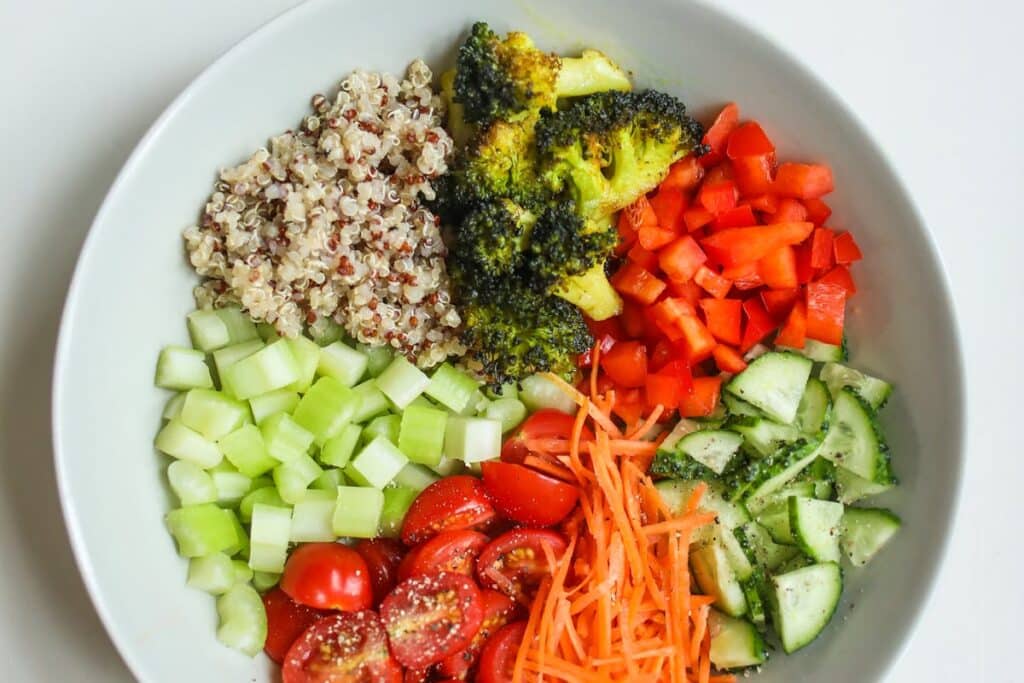
You’ve just finished a tough workout and wonder if it’s smart to fuel up with carbs afterward.
In this article
Your performance, recovery, and overall health are hugely influenced by what you eat before, during, and after your workout. And here’s a little secret – while protein gets a lot of attention, carbohydrates are actually the star player in sports nutrition, both before and after your training.
A lot of science has been done on the relationship between carbs and exercise, so let’s take a closer look.
In this article, we’ll explore the science behind carbs and exercise, the pros and cons of consuming carbs post-workout, potential alternatives to post-workout carbs, how to increase post-workout carb intake, and guidelines for post-workout carb consumption. Let’s get started.
What are carbs?
Carbohydrates, one of the essential macronutrients, are present in a wide range of foods and drinks. They are primarily found in plant-based items like grains. Additionally, in processed foods, carbohydrates are often introduced by manufacturers in the form of starch or added sugars.
Some typical natural sources of carbohydrates include:
- Fruits
- Vegetables
- Dairy products like milk
- Nuts
- Various types of grains
- Seeds
- Legumes, including beans, peas, and lentils
The Science Behind Carbs and Exercise
Exercise increases your body’s need for carbs, so it’s no wonder that many athletes swear by carb-loading after a workout! Carbs are important in helping your body to restore energy and repair muscle fibers after exercise.
They are broken down into glucose, which is then used to fuel muscle contraction and protein synthesis. Protein synthesis is essential for muscle recovery and growth.
Carbs also help to replenish glycogen stores, which are depleted during exercise. Glycogen is the main energy source for intense exercise, and when it is depleted, it can take a long time for the body to recover.

Eating carbs after a workout helps to replenish glycogen stores and speed up the recovery process.
Carbohydrates also help to reduce inflammation and oxidative stress, which are both common after strenuous exercise. Studies have shown that eating carbs can reduce muscle soreness and fatigue, allowing you to exercise at a higher intensity for longer periods of time.
Pros and Cons of Consuming Carbs Post-Workout
Exercising can leave your muscles feeling tired and depleted, but what happens next can make a big difference in how quickly you recover. Consuming certain foods post-workout can help replenish energy and nutrients that were lost during the session. Carbs are one of the key nutrients that can help your body recover efficiently and can offer some other benefits as well.
Here are the pros and cons of consuming carbs post-workout:
- Pros: Eating carbs post-workout can help replenish depleted glycogen stores in the body, which can improve your recovery time. Additionally, carbs can help stimulate muscle growth, as they are necessary for the body to synthesize protein.
- Cons: Consuming too many carbs post-workout can cause your body to store more fat and make it difficult to lose weight. Additionally, eating too many carbs can cause digestive problems.
What are the best carbs to eat after a workout?
Once your workout is over, it’s crucial to initiate the recovery phase. This involves replenishing carbohydrates, electrolytes, and fluids that were depleted during your physical activity. Carbohydrates play a key role in restoring glycogen, which is the stored form of carbohydrate in your muscles. The National Academy of Sports Medicine suggests that a person weighing 150 pounds should consume approximately 68 to 102 grams of carbs after their workout for effective recovery.
Post-exercise, it’s recommended to have a mix of protein and carbohydrates. Opt for carbs that your body can easily absorb to restore the energy you’ve expended quickly. According to Enright, this combination is vital for recovery.
To maximize muscle protein synthesis and aid in recovery, include about 20 to 30 grams of protein along with your carbs within an hour after completing your workout. The focus of your post-workout meal should vary depending on the type of exercise. After a cardio-heavy session, prioritize carbohydrates. If your workout focused on strength training, then protein should take the center stage.
Some healthy post-workout snack ideas that combine carbs and protein are:
- Whole-wheat toast with avocado and tofu
- Greek yogurt mixed with berries and granola
- Brown rice paired with black beans and steamed broccoli
- Quinoa with asparagus and edamame
- A smoothie bowl full of fruits, greens, and veggies, with an optional scoop of protein powder for an extra boost.
Potential Alternatives to Post-Workout Carbs
After a strenuous session, refueling your body is essential for recovery, but not all options have to include carbs. Depending on the type and intensity of your workout, there are other alternatives that may be more beneficial for your post-workout recovery.
High-intensity workouts often require a higher amount of carbohydrates to help the body recoverHowever, for low intensity workouts, alternative sources such as healthy fats, plant-based proteins, and other nutrient-dense foods can be consumed to help the body recover. Eating a balanced meal of carbohydrates, proteins, and healthy fats helps the body to recover and rebuild after a workout.

Eating protein soon after a workout can be a great way to aid in muscle recovery and growth. Protein has been shown to speed up muscle tissue repair and help with muscle soreness. Timing is key when it comes to consuming protein, as it should be eaten as soon as possible after exercise for the best results.
How to Increase Post-Workout Carb Intake
Strategic timing of your carb intake in combination with other essential nutrients can maximize the benefits of post-workout fuel. Here are some helpful tips to increase your post-workout carb intake:
- Combine carbs and protein in your post-workout meal – Protein helps to rebuild and repair damaged muscles, while carbs provide energy.
- Time your carb intake – Consuming carbohydrates within 30 minutes of finishing your workout can help to replenish glycogen stores, replace fluids and reduce muscle breakdown.
- Include healthy carbohydrates – Complex carbohydrates such as wholegrain breads, oats, and quinoa are excellent sources of energy.
- Choose nutrient-dense options – Selecting nutrient-rich foods such as fruits, vegetables, nuts, and seeds can ensure you are getting the most out of your post-workout carb intake.
Guidelines for Post-Workout Carb Consumption
To maximize the benefits of post-workout recovery, it’s important to know the guidelines for carb consumption. Eating the right types of carbohydrates and the right amount of carbs after a workout can help fuel your body and replenish essential nutrients.
Eating carbs after a workout helps replenish glucose levels, which are used by your muscles during exercise, and helps with muscle recovery.
It is recommended to eat 0.5-1 gram of carbohydrates per pound of body weight within 30 minutes of ending your workout. For example, if you weigh 150 lbs, you should aim for 75-150 grams of carbohydrates.
It is also important to ensure that you are consuming quality carbs that are high in fiber and protein. Examples of foods that are high in both fiber and protein include oatmeal, quinoa, and legumes.
Final Word
You’ve learned the science behind carbs and exercise and the pros and cons of consuming carbs post-workout. There are also potential alternatives to post-workout carbs and ways to increase post-workout carb intake. Overall, carbs post-workout can be beneficial when consumed in the right amounts.
However, it’s important to note that everyone’s needs are different, so it’s best to consult with a physician to determine the best post-workout nutrition plan for you. Ultimately, making smart food decisions post-workout can help you reach your fitness goals faster and more effectively.
